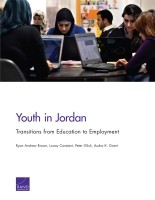| 来源类型 | Research Reports
|
| 规范类型 | 报告
|
| ISBN | 9780833086877
|
| 来源ID | RR-556-CMEPP
|
| Youth in Jordan: Transitions from Education to Employment |
| Ryan Andrew Brown; Louay Constant; Peter Glick; Audra K. Grant
|
| 发表日期 | 2014
|
| 出版年 | 2014
|
| 页码 | 48
|
| 语种 | 英语
|
| 结论 |
High Youth Unemployment Is a Major Economic and Social Concern in Jordan- Economic growth has created jobs, but not the jobs that youth aspire to.
- Youth have a strong preference for limited public sector jobs, which provide security and benefits.
- However, youth do not hold unrealistically high expectations of finding government jobs. Overall, they display pessimism about obtaining good employment of any sort.
- Young men are consequently uncertain about their ability to marry and support a family.
Youth's Education Is Not Aligned with Skill Requirements of the Private Sector Labor Market- Many youth recognize the lack of suitability of their educational preparation for the requirements of the job market.
- Youth do not feel free to pursue careers valued by the market, but instead feel pressure to conform to parental or societal expectations.
- Obtaining higher levels of education was widely desired, but youth face barriers to achieving this goal, including the overwhelming importance of the secondary school exit exam and the financial costs of higher education.
Most Young Women Interviewed Have Career Aspirations- Although overall female labor-force participation is very low in Jordan, female youth expressed the desire to work, and many would delay marriage to pursue careers.
- Female youth are constrained in their choices by external factors such as family and societal pressures and expectations, not by internalized preferences for traditional jobs or family roles.
- Career choices for women entering the workforce are limited beyond the government sector and within the government, restricted to certain areas such as teaching.
|
| 摘要 |
- School curricula at both secondary and postsecondary levels should be reoriented to professions that will be more in demand, especially by the private sector, such as scientific and technical professions. Use incentives, such as directing more scholarships or financial aid to such areas of study, to encourage greater interest in private sector careers.
- Expand and improve health insurance and unemployment insurance, because strong social safety nets and public support to the unemployed will serve to reduce risks incurred by choosing private sector work.
- Explore offering tax breaks or other incentives to employers in nontraditional fields and in the private sector to hire women.
- Provide encouragement and financial incentives for girls to study in nontraditional areas such as science and technology.
- It may also be necessary to enact measures that alleviate particular constraints to women's ability to work (e.g., providing free or convenient transportation to work).
|
| 主题 | Education Policy
; Employment and Unemployment
; Gender Equity in the Workplace
; Jordan
; Occupations
; Wages and Compensation
; Workforce Diversity
; Workforce Management
|
| URL | https://www.rand.org/pubs/research_reports/RR556.html
|
| 来源智库 | RAND Corporation (United States)
|
| 资源类型 | 智库出版物
|
| 条目标识符 | http://119.78.100.153/handle/2XGU8XDN/107826
|
推荐引用方式
GB/T 7714 |
Ryan Andrew Brown,Louay Constant,Peter Glick,et al. Youth in Jordan: Transitions from Education to Employment. 2014.
|
|
文件名:
|
x1495316367967.jpg
|
|
格式:
|
JPEG
|

|
文件名:
|
RAND_RR556.pdf
|
|
格式:
|
Adobe PDF
|
除非特别说明,本系统中所有内容都受版权保护,并保留所有权利。